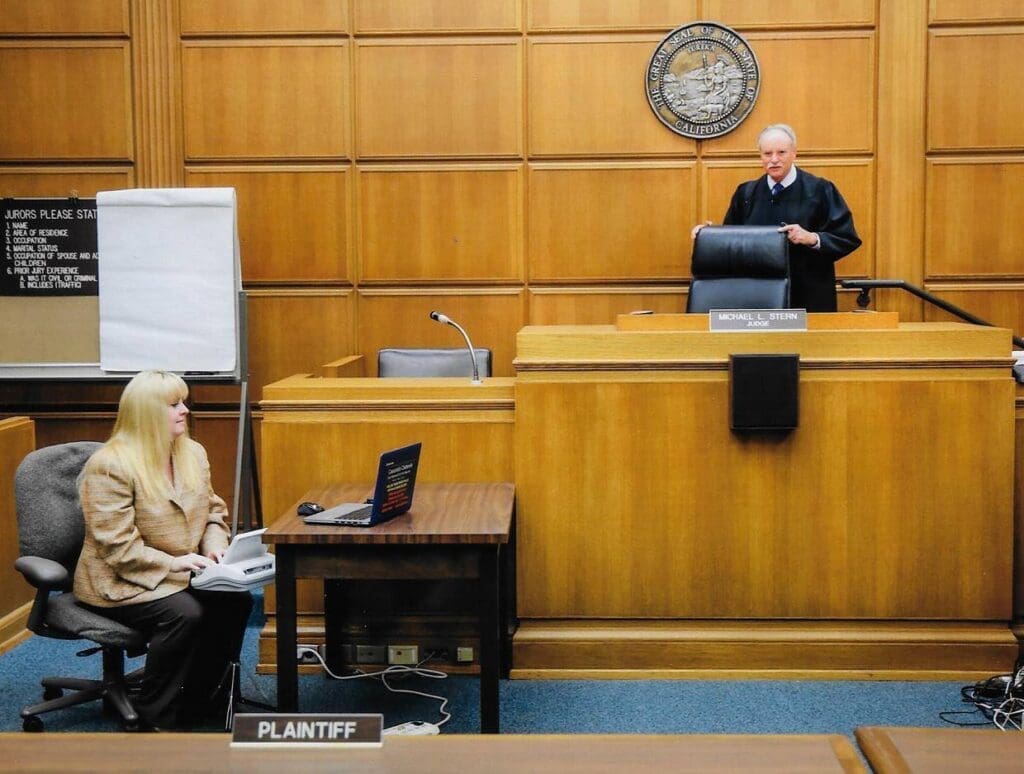A California bill would allow people who pass a national court reporters examination to work as a court reporter in California, without passing the state’s test.
Senate Bill 662 was amended March 20 to grant provisional court reporting certificates to people who pass the Registered Professional Reporter Examination conducted by the National Court Reporter Association. The certificate would expire after three years.
Sen. Susan Rubio (D-West Covina) wrote the bill. She has not yet replied to our request for comment. The California Court Reporter Association did not respond to a request for comment.
“The lack of a verbatim record of court proceedings may result in attorneys declining to take cases on appeal or may result in law enforcement being unable to enforce, among others, active restraining orders or child custody and visitation orders,” the text of the bill says.
The entire nation is in a court reporter shortage, and the Inland Empire is especially impacted.
Riverside Superior Court has 71.5 filled court reporter positions and 17 vacancies, making a 20% vacancy rate, Marita Ford, interim-Court Executive Officer at Riverside Superior Court, said by email.
“We are aware of SB 662 and support any actions taken so that the court is able to draw more qualified applicants to the position,” Ford said.
San Bernardino is short 20 court reporters, court executive assistant Nataki Clark said by email. The court had 96 authorized positions, Presiding Judge Glenn Yabuno said at his State of the Court address Feb. 16.
“We continue to look for opportunities to attract and retain official court reporters,” Clark said.
A Jan. 25 report for the California Trial Court Consortium said that courts across the state, on average, have 19% vacancy rates for their court reporter positions.
The shortage is causing courts to prioritize certain case types to have court reporters over others.
In San Bernardino, as of Feb. 27, official court reporters are unavailable for misdemeanors, civil cases and probate. They are provided in criminal trials and felony, juvenile, family law and conservatorship cases.
The court reporter shortage, said Yabuno, is due to a shortage of schools, California’s high standard certification test, declining interest in the profession and competition from other states and private reporting companies.
Representatives of South Coast College, which teaches court reporting, that the shortage is partially caused by the intensity of California’s court reporting certification, and technical issues with the examination’s remote format.
California’s exam is the most intense of all states, SCC president and owner Jean Gonzalez said.
Test takers must transcribe a 10-minute conversation with four different speakers with 97.5% accuracy. Most states require transcription of only a five-minute conversation with two speakers at 95% accuracy. Some states, such as Virginia, do not require court reporters to take a test at all, so qualified reporters are leaving the state and finding work elsewhere, Gonzalez said.
“People want to start making money, so what are they going to do? Leave the state,” Gonzalez said.
In 2021, 175 examinees took the state’s licensing exam, and 36 passed, according to a letter on the court reporter shortage jointly published by all of California’s superior courts.
The Registered Professional Reporter examination is easier than California’s Certified Shorthand Reporter examination. For one thing, there are the accuracy rates mentioned above.
The RPR also requires three speeds of recording: five minutes at 180 words per minute, five minutes at 200 words per minute and five minutes at 225 words per minute.
The CSR requires 10 minutes at 200 words per minute.
A person can make a combined 142 errors on the RPR and still pass, but will fail with more than 50 errors on the CSR.
The RPR allows a combined three hours and 45 minutes to transcribe all 15 minutes of speech, while the CSR gives two hours and 30 minutes.
South Coast College said it did not endorse the bill.
“Students who have qualified meeting these Olympian standards at their respective schools should be given an equal opportunity to work for three years provisionally if we are to give reporters from other states who did not meet these standards the opportunity to work provisionally,” they said in an emailed statement.
By Aidan McGloin, Follow Our Courts, “Bill would bypass state court-reporter license requirements”











